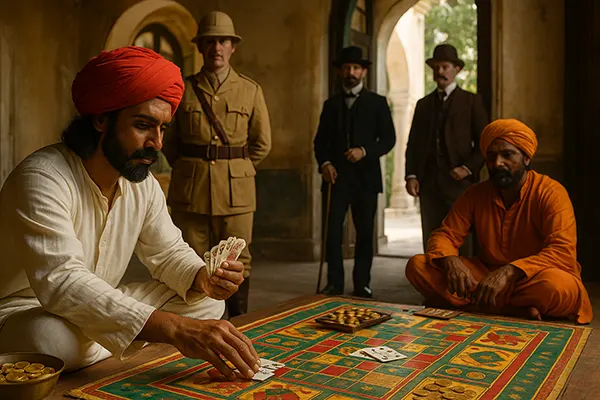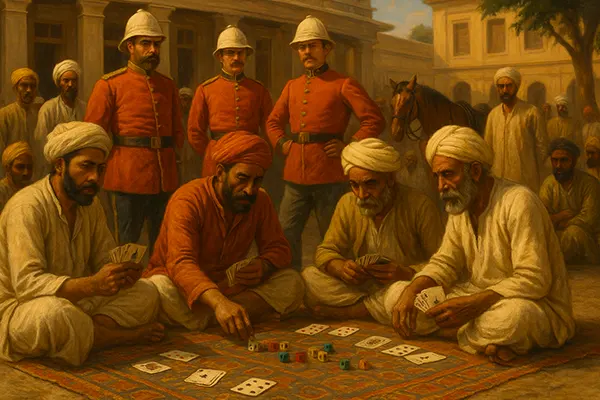During the British colonial rule in India, gambling practices were deeply affected by imperial policies and cultural exchanges. While some traditional Indian games were marginalised or transformed, others were regulated and monetised under British governance. The legacy of these changes still echoes in India’s modern-day gambling laws and social attitudes.
The Impact of British Rule on Traditional Indian Games
Prior to British colonisation, gambling had been embedded in Indian society for centuries. Ancient games like dice (called “pasha” or “chaupar”) and card-based games were not just entertainment but also connected to mythology and seasonal festivals. However, when the British East India Company began asserting control, attitudes towards these practices began to shift. The colonial administration considered many Indian gambling practices disorderly or morally questionable, aligning with Victorian-era sensibilities.
Rather than embracing native customs, the British aimed to ‘civilise’ the population by imposing restrictions on games that were previously tolerated or celebrated. Dice games were particularly targeted, and gambling in public spaces became associated with criminal activity. The colonial view prioritised control over native customs, contributing to the stigmatisation of many local games.
This disapproval wasn’t uniformly enforced, however. In some regions, the British allowed limited gambling operations as a form of revenue generation—especially lotteries and betting on horse racing, which mirrored their own leisure pursuits. This selective approach highlighted the imperial double standard: suppressing local traditions while preserving similar practices of European origin.
Legal Reforms and the Establishment of British-style Betting
One of the most lasting legacies of the British Empire in India is the Public Gambling Act of 1867. This legislation aimed to curb widespread gambling and remains a legal foundation for current gambling restrictions in many Indian states. The law differentiated between games of skill and games of chance—a distinction still debated today.
Horse racing was notably exempted from many legal restrictions. Introduced by the British elite, it became a popular form of regulated gambling. The imperial government invested in racecourses, established turf clubs, and even supported bookmaking under tightly controlled licences. These developments institutionalised betting practices in a way that continues into the present day.
Meanwhile, traditional games were either outlawed or marginalised. The Public Gambling Act offered no protection or recognition to indigenous games, further pushing them into illegality or extinction. This legal legacy shows how colonial influence favoured foreign norms and left native traditions vulnerable.
Socio-cultural Shifts and the Decline of Indigenous Gambling
The colonial narrative didn’t just affect laws—it reshaped public perception. Indian elites under British influence began adopting western lifestyles, and with them, British recreational norms. This led to the gradual erosion of the status of traditional gambling practices, which were seen as primitive or backwards in comparison to regulated British-style games.
Festivals that once featured casual gambling, such as Diwali, began to see reduced participation in open gambling events. Communities feared legal repercussions or social judgement influenced by colonial morality. Even within families, the perception of card games shifted from being festive activities to potentially illicit behaviour.
At the same time, British-imported games like poker, bridge, and horse betting gained prestige among urban Indians. These shifts were reinforced through English-language education and the introduction of western legal frameworks. The result was a cultural pivot where Indian traditions were devalued in favour of colonial models of entertainment.
Gender and Class Dynamics in Colonial Gambling Culture
Colonial gambling spaces were often exclusive, reflecting the class hierarchies imposed by the British. Horse races and turf clubs catered primarily to colonial officers and Indian aristocrats, creating an elite gambling subculture. The accessibility of these events was deliberately restricted through dress codes, membership requirements, and high stakes.
For Indian women, gambling opportunities were even more constrained. In pre-colonial India, women might participate in domestic forms of gambling during festivals. But British moral frameworks reinforced patriarchal norms, reducing women’s visibility and agency in public gambling settings. Gambling became coded as a male activity tied to imperial authority.
This shift had long-lasting effects on the inclusivity of gambling in India. Even today, gambling remains largely male-dominated, and upper-class associations with certain forms of betting, like horse racing, continue to reflect colonial social patterns.

Lasting Legal and Cultural Consequences Post-Independence
After India gained independence in 1947, many colonial laws remained in effect, including the Public Gambling Act. Despite technological and social evolution, gambling remains heavily restricted in most states. The colonial categorisation of gambling as either moral or immoral, based on British standards, continues to shape regulatory frameworks.
The emergence of state-run lotteries and legalised casinos in regions like Goa reflects a cautious liberalisation. However, these changes often mirror British licensing models rather than drawing on pre-colonial Indian gambling customs. Thus, while some modern developments exist, they still carry the legacy of colonial structures.
Culturally, there remains a tension between viewing gambling as entertainment and associating it with social deviance. This contradiction is a product of British-era reform movements and legal norms that continue to influence societal values in India today. A full reclamation of indigenous gambling culture remains an ongoing debate.
The Role of Memory and Heritage in Gambling Practices
Today, scholars and cultural historians are re-examining India’s gambling traditions with a focus on decolonisation. By exploring the games played in pre-colonial courts, markets, and homes, they aim to reconstruct a heritage erased or marginalised by British rule. These efforts are part of a broader project to restore indigenous knowledge systems.
Artistic and literary depictions of traditional gambling—such as in the Mahabharata—are also being reclaimed as sources of cultural legitimacy rather than moral caution. This shift in perspective allows modern Indians to understand gambling not just as a vice, but as a layered historical and social phenomenon.
Public discourse around gambling regulation is beginning to reflect these complexities. Activists and lawmakers are calling for more nuanced legislation that acknowledges both contemporary realities and historical legacies. The influence of the British Empire on Indian gambling is no longer viewed solely as law and order—it is increasingly seen as cultural transformation.

